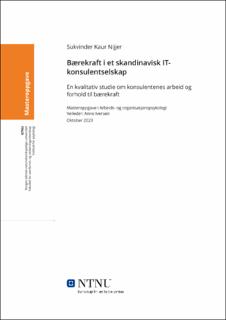| dc.contributor.advisor | Iversen, Anne | |
| dc.contributor.author | Kaur Nijjer, Sukvinder | |
| dc.date.accessioned | 2024-01-26T18:19:28Z | |
| dc.date.available | 2024-01-26T18:19:28Z | |
| dc.date.issued | 2023 | |
| dc.identifier | no.ntnu:inspera:155667938:9705603 | |
| dc.identifier.uri | https://hdl.handle.net/11250/3114154 | |
| dc.description.abstract | Denne kvalitative studien undersøker hvordan ansatte i et skandinavisk IT-konsulentselskap opplever og forholder seg til bærekraft gjennom sitt arbeid i kundeprosjekter, og hva dette kan lære Bedriften i deres videre arbeid. Formålet med studien er å undersøke hvilke rammer rundt konsulentenes arbeid som er mest fremtredende, og hvordan disse kan påvirke måten de forholder seg til bærekraft. Datamaterialet er samlet inn gjennom personlige dybdeintervju med fem konsulenter og fire nøkkelpersoner. I analysen er refleksiv tematisk analyse benyttet, informert av kritisk realisme som vitenskapelig ståsted. Funnene sees i lys av sosial utvekslingsteori, i tillegg til forskning på pro-miljøatferd og sentrale forhold ved konsulentenes arbeid. Resultatene tyder på at hvordan konsulentene opplever og forholder seg til bærekraft i sitt arbeid forekommer gjennom en komplisert interaksjon mellom individets, Bedriftens og kundenes kortsiktige og langsiktige behov. Dette kan komme av at konsulentene fungerer som bindeleddet mellom kundene og Bedriften i denne interaksjonen. Denne posisjoneringen gir konsulentene muligheten til å utvikle sin dybde- og breddekunnskap innen gitte fagområder og bransjer, men det gjør også at de må håndtere diskrepansen mellom partenes ulike behov i kundeprosjektene. Når behovene er vanskelige å forene kan det oppstå et spenningsforhold, noe som kan føre til at konsulenten må prioritere noen behov over andre. Resultatene tyder samtidig på at konsulentene har varierende kunnskap om bærekraft og opplever det som komplisert og omfattende, i tillegg til at de muligens opplever usikkerhet rundt i hvilke grad og på hvilken måte bærekraft skal inkluderes i deres arbeid. Dette kan muligens bidra til at bærekraft nedprioriteres, spesielt når bærekraft ikke er integrert i kundeprosjektet fra start. Bedriftens videre utvikling av deres bærekraftarbeid bør derfor ta hensyn til interaksjonen mellom konsulenten og kunden. Samtidig kan det være en fordel å skape bevissthet om hvilke verktøy konsulentene kan bruke for å inkludere bærekraft i kundeprosjektene, i tillegg til å legge til rette for kompetanseheving som knyttes mot konsulentenes fagområder. Det kan samtidig være fordelaktig for Bedriften å skape tydelige forventninger og retningslinjer rundt ansattes arbeid med bærekraft, som både er rettet mot konsulentene og kundene.
Nøkkelord: bærekraft, bærekraftig utvikling, konsulentvirksomhet, teknologi, pro-miljøatferd, ekstrarolleatferd, sosial utvekslingsteori, kritisk realisme og tematisk analyse | |
| dc.description.abstract | This qualitative study explores how employees in a Scandinavian IT consulting company perceive and engage with sustainability in their work on client projects and what this can teach the company for their future endeavors. The study aims to investigate the prominent frameworks surrounding consultants' work and how these can influence their approach to sustainability. I collected the data through in-depth personal interviews with five consultants and four key individuals. The analysis utilized reflexive thematic analysis, informed by critical realism as the scientific standpoint. The findings are viewed through social exchange theory, research on pro-environmental behavior, and key aspects of consultants' work. The results suggest that how consultants perceive and engage with sustainability in their work occurs through a complex interaction involving the individual's, the company's, and the client's short-term and long-term needs. This complexity could be because consultants act as intermediaries in this interaction between clients and the company. This positioning allows consultants to enhance their in-depth and broad knowledge within specific subject areas and industries. However, it also requires them to navigate the discrepancy between the parties' differing needs in client projects. When needs are challenging to reconcile, tension may arise, potentially leading the consultant to prioritize particular needs over others. Moreover, the results indicate that consultants possess varying levels of knowledge about sustainability and find it complex and extensive. Additionally, they may experience uncertainty regarding the extent and way they should incorporate sustainability into their work. The perception of sustainability as complex and extensive, along with the above-mentioned uncertainty, could result in the deprioritization of sustainability, especially when sustainability is not initially integrated into the client project. Consequently, the company's continued development of sustainability efforts should consider the interaction between the consultant and the client. Simultaneously, it may be beneficial to raise awareness of the tools consultants can employ to integrate sustainability into client projects and facilitate skill development related to consultants' areas of expertise. It could also be advantageous for the company to establish clear expectations and guidelines regarding employees' sustainability work directed toward consultants and clients.
Keywords: sustainability, sustainable development, consultancy, technology, pro-environmental behavior, extra-role behavior, social exchange theory, critical realism, and thematic analysis | |
| dc.language | nob | |
| dc.publisher | NTNU | |
| dc.title | Bærekraft i et skandinavisk IT-konsulentselskap - En kvalitativ studie om konsulentenes arbeid og forhold til bærekraft | |
| dc.type | Master thesis | |
